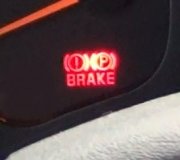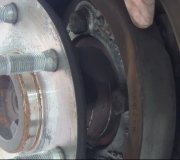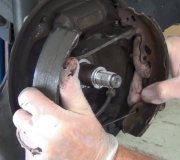You have a leak. In every single case of a leaking steel line, rubber flex hose, or wheel cylinder, there was no leak one minute and it was leaking the next minute. You never know when that is going to happen.
The fact that there is a puddle underneath will make it pretty easy to locate the cause of the leak, and it is going to be related to one half of the system. You still will have some brakes even though the brake pedal goes down too far.
Also, to add to the mechanic's frustration and to yours, you will likely also need a rebuilt master cylinder, but there is often no way to know until after the leak has been fixed. Crud and corrosion build up in the lower halves of the two bores where the pistons do not normally travel. When you push the brake pedal all the way to the floor, regardless if it is from being surprised by a leak, or by improper bleeding procedures, the rubber lip seals get run over that crud and can be ripped. That results in a slowly sinking brake pedal, and that often does not show up until two or three days later. This mainly applies to a car that is more than about a year old. Fortunately most master cylinders are not terribly expensive. Many shops will automatically include the cost of a replacement in their estimate so you are covered in case it is needed. If they have your best interest at heart, they will want to replace it right away. If they are more concerned with your wallet, they may give you a repair estimate that does not include the master cylinder, so be careful if you are comparing two or more estimates from different shops. Be sure they are including the same things.
We normally do not have the best of communication skills, but the better shops will explain why the master cylinder might fail, and they will let you decide if you want to risk leaving the old one alone. That is fine as long as you understand it may fail in a short time and there is no cause to be angry with the mechanic.
Saturday, May 14th, 2016 AT 3:14 PM


